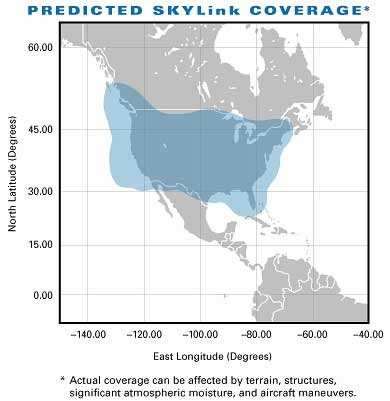Wed, Sep 22, 2004
But Where Will We Get The Bandwidth?
 As the world's airlines this week
view new in-flight passenger services with big bandwidth
requirements, ARINC Incorporated is showing where they can get all
that in-flight bandwidth -- and how to add valuable services for
the flight deck at the same time.
As the world's airlines this week
view new in-flight passenger services with big bandwidth
requirements, ARINC Incorporated is showing where they can get all
that in-flight bandwidth -- and how to add valuable services for
the flight deck at the same time.
ARINC is demonstrating its Commercial SKYLink broadband solution
with a live Ku-band satellite link in operation at Booth 323 of the
World Airline Entertainment Association (WAEA) 2004 convention in
Seattle (WA). The live SKYLink satellite demo includes a range of
passenger applications and 802.11b/g wireless Internet access.
 If you're at the convention, ARINC
says go ahead and bring your Wi-Fi laptop and PDA to Booth 323 and
"log on" wirelessly to the fully operational satellite connection
to send and receive e-mails or surf the Internet. ARINC has
integrated SKYLink with several most-wanted passenger services and
it can also deliver applications for the electronic cockpit, such
as graphical weather information for display on electronic flight
bags.
If you're at the convention, ARINC
says go ahead and bring your Wi-Fi laptop and PDA to Booth 323 and
"log on" wirelessly to the fully operational satellite connection
to send and receive e-mails or surf the Internet. ARINC has
integrated SKYLink with several most-wanted passenger services and
it can also deliver applications for the electronic cockpit, such
as graphical weather information for display on electronic flight
bags.
"Whether the end user is a co-pilot or a passenger, SKYLink
provides the inflight bandwidth tomorrow's applications will need,"
said Senior Director Tom Mullan. "We are holding active discussions
with several airlines. Commercial SKYLink is smaller, cheaper,
lighter and more capable than competing inflight solutions."
ARINC says a major selling point of Commercial SKYLink is the
compact hardware package itself; just 150 pounds including its
low-profile antenna. ARINC says that means lower aerodynamic drag
and significant fuel savings over the satellite broadband
competition.
Commercial SKYLink is built on ARINC's successful broadband
technology for business aircraft, but offers 100% more bandwidth --
5 Mbps to the aircraft and 256 Kbps off-aircraft. SKYLink satellite
coverage went live over North America in April, and
SKYLink-equipped business jets now have 2-way satellite broadband
service from coast to coast on the SES Americom Ku-band satellite
constellation. Coverage expansion is planned in 2005 to include the
North Atlantic routes, Europe, and the Middle East.

"Carriers thinking about Ku-band satellite broadband can keep
all their options open with SKYLink," said Mullan. "We have
optimized the design for retrofit, and unlike rigid OEM approaches
we have kept SKYLink a highly configurable system to meet any
foreseeable fleet requirements. We can even deliver our compact
SKYLink business jet solution for low-cost carriers seeking to
minimize the cost and footprint of broadband."
More News
Its Offerings Are Lighter, Cleaner, and Now Pushing Past 1,000nm on SAF Jet Fuel DeltaHawk’s diesel-powered aircraft lineup has seen incredible upgrades over the last few yea>[...]
The Airplane Experienced A Total Loss Of Engine Power On December 3, 2025, about 1600 central standard time, a Mooney Aircraft Corp. M20K, N57229, was substantially damaged when it>[...]
Make Sure You NEVER Miss A New Story From Aero-News Network Do you ever feel like you never see posts from a certain person or page on Facebook or Instagram? Here’s how you c>[...]
Aero Linx: European Society of Aerospace Medicine (ESAM) As a pan-European, independent forum, it works to promote the safety and health of all persons involved in aviation and spa>[...]
“We are excited to see Wisk achieve this milestone, and I’m so proud of the team that made it possible. The team at Wisk has built advanced technologies across flight c>[...]
 Aero-TV: DeltaHawks Diesel Power Steps Into the Spotlight
Aero-TV: DeltaHawks Diesel Power Steps Into the Spotlight NTSB Prelim: Mooney Aircraft Corp. M20K
NTSB Prelim: Mooney Aircraft Corp. M20K ANN FAQ: Turn On Post Notifications
ANN FAQ: Turn On Post Notifications ANN's Daily Aero-Linx (12.20.25)
ANN's Daily Aero-Linx (12.20.25) Aero-News: Quote of the Day (12.20.25)
Aero-News: Quote of the Day (12.20.25)





